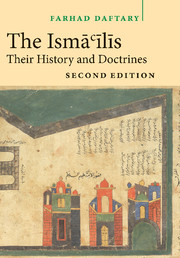Book contents
- Frontmatter
- Contents
- Illustrations and maps
- Foreword by Wilfred Madelung
- Preface to the first edition
- Preface to the second edition
- Note on the text and abbreviations
- 1 Introduction: progress in the study of the Ismāʿīlīs
- 2 Origins and early development of Shīʿism
- 3 Early Ismāʿīlism
- 4 The Fāṭimid period until 487/1094: dawla and daʿwa
- 5 The later Fāṭimids and Mustaʿlian Ismāʿīlism
- 6 Nizārī Ismāʿīlī history during the Alamūt period
- 7 The post-Alamūt centuries and modern developments in Nizārī Ismāʿīlī history
- Genealogical tables and lists
- Glossary
- Notes
- Select bibliography
- Index
- Frontmatter
- Contents
- Illustrations and maps
- Foreword by Wilfred Madelung
- Preface to the first edition
- Preface to the second edition
- Note on the text and abbreviations
- 1 Introduction: progress in the study of the Ismāʿīlīs
- 2 Origins and early development of Shīʿism
- 3 Early Ismāʿīlism
- 4 The Fāṭimid period until 487/1094: dawla and daʿwa
- 5 The later Fāṭimids and Mustaʿlian Ismāʿīlism
- 6 Nizārī Ismāʿīlī history during the Alamūt period
- 7 The post-Alamūt centuries and modern developments in Nizārī Ismāʿīlī history
- Genealogical tables and lists
- Glossary
- Notes
- Select bibliography
- Index
Summary
Early Ismāʿīlism, or the pre-Fāṭimid period in Ismāʿīlī history, is one of the most obscure major phases in the entire history of Ismāʿīlism. It extends from the proto-Ismāʿīlī origins of the movement, in the middle of the 2nd/8th century, to the establishment of the Fāṭimid caliphate in the year 297/909, a period of almost one and a half centuries. Little reliable information is available on the history and doctrines of the early Ismāʿīlīs who contributed to the success and intellectual development of this branch of Shīʿism. As a result, many aspects of early Ismāʿīlism continue to be shrouded in uncertainty, causing irreconcilable disagreements among modern scholars regarding some key issues and events.
The particular difficulties of studying the early Ismāʿīlīs stem partly from the general dearth of accurate information on Shīʿism during the early ʿAbbāsid period, when the major Shīʿī communities of Ithnāʿashariyya and Ismāʿīliyya, then in the process of being formed, were for the most part severely persecuted and thus had to resort to taqiyya to safeguard themselves. More significantly, however, the persistence of research difficulties here has been due to the fact that few genuine Ismāʿīlī sources have survived from this early period. It is highly probable that the early Ismāʿīlīs, living in an extremely hostile milieu, did not produce any substantial volume of literature, preferring instead to propagate their doctrines mainly by word of mouth. The modern rediscovery of Ismāʿīlī literature has, indeed, confirmed this suspicion.
- Type
- Chapter
- Information
- The Isma'ilisTheir History and Doctrines, pp. 87 - 136Publisher: Cambridge University PressPrint publication year: 2007



